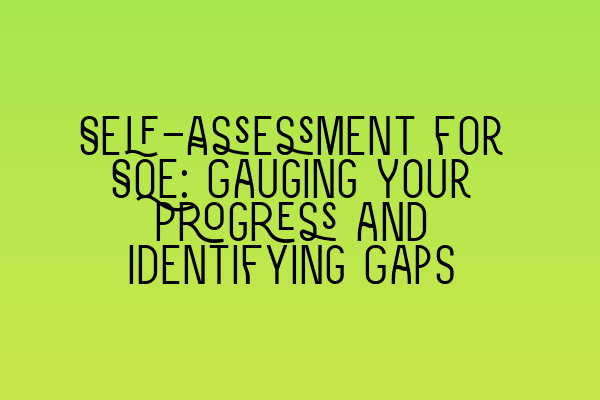Self-Assessment for SQE: Gauging Your Progress and Identifying Gaps
Preparing for the Solicitors Qualifying Exam (SQE) is no easy task. It requires dedication, hard work, and a deep understanding of the legal principles and practices. As you embark on this journey to become a qualified solicitor, it is important to regularly assess your progress and identify any gaps in your knowledge. In this article, we will explore the concept of self-assessment for SQE and provide you with insights on how to gauge your progress effectively.
Why is Self-Assessment Important?
Self-assessment is a critical component of any learning process, and preparing for the SQE is no exception. By regularly evaluating your knowledge and skills, you can identify areas where you excel and areas where you need improvement. This allows you to focus your efforts on the areas that require more attention, ultimately increasing your chances of success in the exam.
Additionally, self-assessment helps you build confidence in your abilities. As you track your progress and witness your growth, you will gain a sense of achievement and motivation to keep pushing forward. Moreover, self-assessment enables you to adopt a proactive approach to your learning, taking control of your own development rather than relying solely on external feedback.
How to Self-Assess for SQE
Now that we understand the importance of self-assessment, let’s explore some effective strategies to gauge your progress and identify gaps in your knowledge:
1. Create a Study Plan
A well-structured study plan is the foundation of effective self-assessment. Start by organizing the topics and subjects that will be covered in the SQE. Break them down into manageable chunks and allocate specific time slots for each topic. This will help you track your progress and ensure you allocate enough time to cover all areas adequately.
2. Set Measurable Goals
Goal-setting is crucial for self-assessment. Set specific, measurable goals that align with the learning objectives of the SQE. For example, you might set a goal to understand the key principles of joint ownership for co-owners of property. By having clear goals, you can track your progress and ascertain how well you are meeting each objective.
If you want to learn more about joint ownership, check out this article for legal considerations for co-owners of property.
3. Take Practice Tests
Practice tests are invaluable tools for self-assessment. They simulate the exam environment and allow you to assess your knowledge and identify areas of weakness. Take advantage of sample SQE questions and past papers to test your understanding of various legal concepts and principles.
4. Seek Feedback
While self-assessment primarily involves evaluating your own progress, seeking feedback from others can provide valuable insights. Collaborate with study groups, mentors, or tutors who can review your work and provide constructive feedback. Their input will help you gain a fresh perspective and identify blind spots that you may have overlooked.
Identifying Gaps and Addressing Them
Once you have conducted a thorough self-assessment, it is crucial to identify any gaps in your knowledge and take steps to address them. Here are some strategies to help you bridge these gaps:
1. Review Study Materials
If you identify areas where your understanding is lacking, return to your study materials and revisit the relevant topics. Take notes, create summaries, and condense the information to facilitate better comprehension. Consider seeking additional resources or guidance to ensure a comprehensive understanding of the subject matter.
2. Consult Subject Matter Experts
When faced with complex or challenging concepts, don’t hesitate to seek guidance from subject matter experts. Consult professors, professionals, or experienced practitioners who can provide clarity and insights. Their expertise can help you overcome obstacles and deepen your understanding of the topics in question.
For more insights on commercial leases, check out this article on essential insights for business premises.
3. Practice Active Learning Techniques
Active learning techniques enhance knowledge retention and understanding. Engage in activities such as summarizing key points, teaching others, participating in discussions, and solving hypothetical scenarios. This interactive approach will strengthen your grasp of the material and help you apply your knowledge effectively.
Conclusion
Self-assessment is an integral part of your SQE journey. By regularly gauging your progress and identifying gaps in your knowledge, you can tailor your study plan and focus your efforts in the areas that need improvement. Through effective self-assessment, you will build confidence, enhance your understanding, and increase your chances of success in the SQE.
To further enhance your understanding of property law, explore these related articles:

Leave a Reply